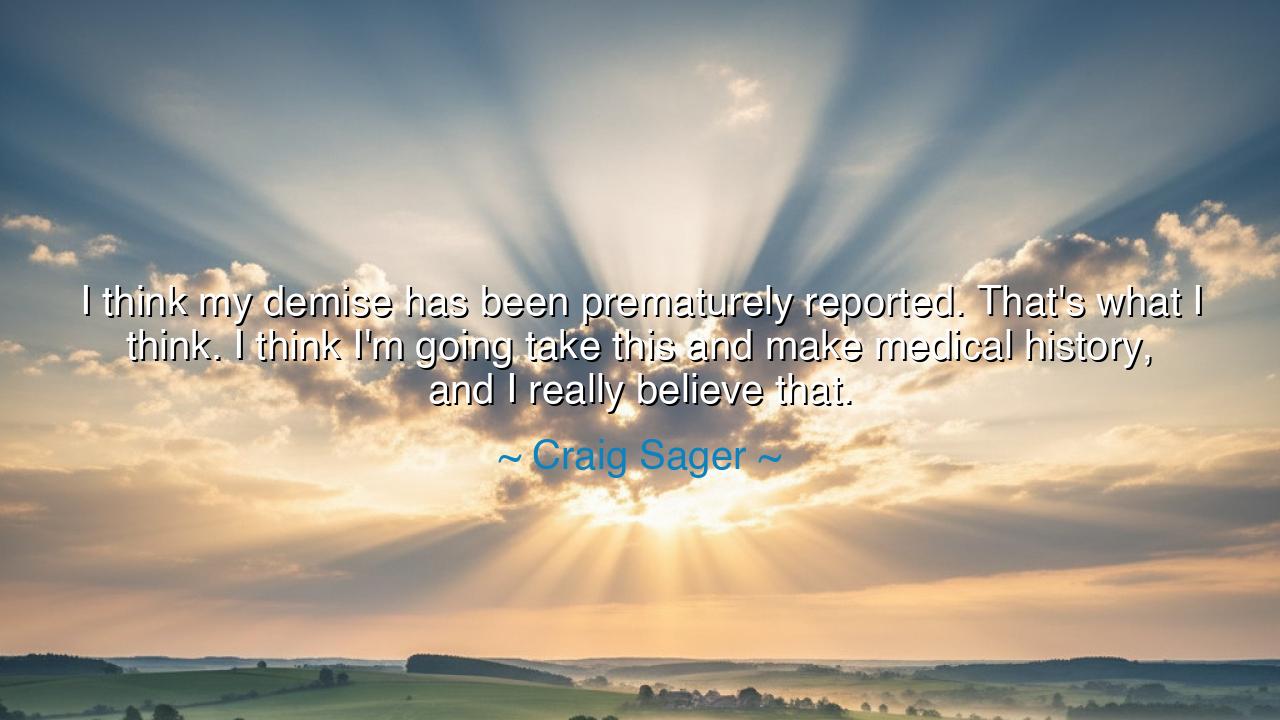
I think my demise has been prematurely reported. That's what I
I think my demise has been prematurely reported. That's what I think. I think I'm going take this and make medical history, and I really believe that.






Hear, O students of courage and bearers of faith, the words of Craig Sager, who once said: “I think my demise has been prematurely reported. That’s what I think. I think I’m going to take this and make medical history, and I really believe that.” These are not the words of denial, but of defiance and sacred hope—the voice of a man who refused to surrender his spirit even when his body faltered. In the face of death, Sager spoke not of fear, but of possibility. He proclaimed, as the ancients might have, that the will of a man may rise even when the flesh is frail—that faith itself can shape destiny.
Craig Sager, known to the world as a vibrant sports reporter, was a man of color, both in spirit and in dress. His suits shone with hues as bold as his optimism. When he faced leukemia, a disease that sought to dim his light, he did not respond with despair but with determination. His declaration that his “demise has been prematurely reported” was more than bravado—it was a modern echo of the warrior’s cry: “I am not yet finished.” His belief that he would “make medical history” did not mean he expected immortality, but that he sought to live with such dignity, strength, and hope that his struggle would inspire others to fight beyond their limits.
In these words lies a truth both ancient and divine: the human spirit is not measured by longevity, but by resilience. The Stoics of old taught that fate may take your health, your wealth, even your breath—but it cannot touch your attitude. Sager embodied this philosophy in the modern age. He did not seek to deny his illness; rather, he sought to transcend it. He understood that courage is not the absence of pain, but the decision to keep shining through it. His confidence in making “medical history” reflected not arrogance, but a profound understanding of the power of belief—belief that one’s struggle can serve as a torch for others lost in darkness.
History is rich with such examples. Consider Lance Armstrong, who, though controversial for other reasons, once stood at the edge of death and declared war on despair. Or think of Helen Keller, who defied blindness and silence to teach the world the boundless nature of human potential. Like them, Craig Sager turned his suffering into a symbol of endurance and beauty. Even as his body weakened, his optimism strengthened, and he continued to appear before the camera, radiant in spirit and suit, a living sermon that declared: “Life is not over until you stop living it.”
The phrase “make medical history” also carries deeper meaning. It reminds us that human progress is often driven by those who endure the impossible. Every great advance in healing has been written in the trials of those who suffered with grace. When Sager said he would make history, he stood as one among countless souls whose courage became part of the collective triumph of medicine and faith. Even if he could not conquer his illness, he contributed to the victory of the human will—the quiet revolution that happens whenever someone chooses to hope against the odds.
The lesson, therefore, is timeless and luminous: never allow others to define your ending. Life may bring you low, but it cannot dictate how you rise. The world may report your demise—your failure, your weakness, your defeat—but only you may confirm it. Let your heart declare, as Sager did, “My story is not yet written.” For every breath is a chance to shape history, not through victory, but through the manner of your fight.
Practical wisdom flows from this truth. When hardship comes—and it will—meet it not with resignation, but with resolve. Speak words of faith, for the language of belief creates the energy of endurance. Let hope be your armor, and perseverance your medicine. Whether in illness, loss, or despair, remember that the world honors not only those who live long, but those who live bravely.
O seeker of strength, remember this: Craig Sager’s words were not a denial of death, but a hymn to life. To “make medical history” was to live so fiercely that even mortality could not diminish him. Let his voice echo within you: Do not let the world decide when your story ends. Rise again, believe again, and live until your last breath as though eternity itself were watching.






AAdministratorAdministrator
Welcome, honored guests. Please leave a comment, we will respond soon